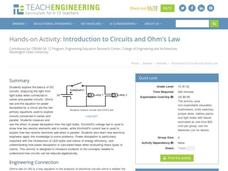Rochester Institute of Technology
Electrical Energy
My friend told me how electricity is measured and I was like Watt! In the hands-on activity, learners explore electricity by building circuits, both parallel and series. They also determine how increasing the number of light bulbs and...
Bonneville
What is Electricity and How Do We Use It?
Use some electrifying lessons to learn about electricity. Future scientists discover the history of electricity and the basics of electric circuits. They learn how to read an electricity bill and then create circuits to power a fan,...
Bonneville
Three Ways to Generate Electricity
Get your hands on electricity. Pupils investigate magnetic fields and make the connection to generators in the fourth lesson plan in a series of six lessons on wind versus solar energy. Learners use a small electric motor as a generator...
NASA
Providing Light for Your Plants
Using a guided lesson, pupils learn about what it takes to make a circuit along with a switch. They build a complete circuit under the direction from the teacher and identify each of the elements of the circuit. Scholars then learn to...
Purdue University
Design of a Door Alarm
How does electricity work? Budding scientists explore the concepts of electrical currents and open and closed circuits with class discussion and a hands-on activity using a battery to turn on a light bulb. Learners also make predictions...
Institute of Electrical and Electronics Engineers
Get Connected with Ohm's Law
Ideal for your electricity unit, especially with middle schoolers, this lesson plan gets engineers using multimeters in electrical circuits to explore the relationships among voltage, current, and resistance. Older learners may even plot...
Purdue University
Light – Just Right!
What does it mean to be resistant to electricity? Scholars answer the question in a six-part STEM activity on electricity. They begin by assessing the conductivity of several different materials and progress to designing their own...
Science Matters
Parallel Circuits
The lights don't always go out when the switch is flipped. The 10th lesson in a series of 14 helps learners build a conceptual understanding of the flow of electricity through a parallel circuit. They then build their own parallel...
Wind Wise Education
What is the Cost of Inefficiency?
What does it cost to keep the lights on? Through a hands-on activity, class members use a watt meter and determine the amount of energy different types of light bulbs use. The class then determines the financial and environmental cost of...
Bonneville
Introduction to Circuits
Light up the class's knowledge. Pupils build a simple circuit using a battery, wire, and a light bulb and create a diagram of their circuit. The teacher provides a short lecture on a complete circuit, calling attention to the direction...
WindWise Education
How Does a Generator Work?
I get a charge out of this. In order to learn how a generator works, groups build and test one in this ninth lesson of the series. The generators are tested at low speed and high speed to determine the watt output and whether they have...
Institute of Electrical and Electronics Engineers
Electric Messages: Then And Now
Learners engage in a instructional activity that is concerned with the history of communication devices that are used today and in the past. They practice using morse code as a look into the past and then cover the modern subjects of...
Foundation for Water & Energy Education
How Can Work Be Done with Water Power? Activity B
In this second of three activities, energy engineers plan and create a hydropower dam as they learn how hydroelectric power plants generate electricity. A hydropower puzzle is also included, which can be worked on by teams that finish...
DiscoverE
Oranges and Batteries
Orange you glad you can make circuits using fruit? Young electricians learn about electric circuits and electricity. As part of the lesson, they build a circuit with an orange and then with a banana.
Carnegie Mellon University
How Power Plants Work 2
In this second of three lessons on power plants, future engineers find out how we generate electricity and how coal-powered plants operate. They work in small groups to make electromagnet generators to light LED bulbs. A set of...
Institute of Electrical and Electronics Engineers
Series and Parallel Circuits
Students demonstrate simple circuits and find the differences between parallel and serial circuits. In this electronic lesson plan students work in teams to test different designs using a low voltage light bulb.
Teach Engineering
Introduction to Circuits and Ohm's Law
Take a very basic understanding of circuits and develop a strong understanding of the parts and function of a circuit. This activity is developed to be an independent exploration of circuits from the basics to series and parallel models....
Cornell University
Making a Battery
Don't be shocked when your class has a blast making their own batteries! Science scholars examine a dry cell battery, then design and construct a wet cell battery. The activity guides them through the parts of a battery, the variables...
Starry Night Education
The Stars
Three astronomy activities in one resource! Here you will find one hands-on activity, one demonstration, both with discussion questions, and one activity worksheet. During these lessons young scientists discuss how stars are different,...




















